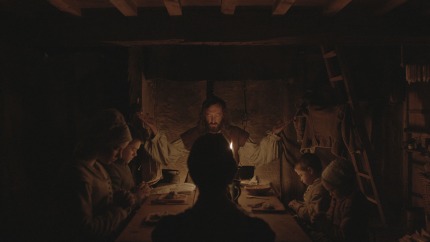
Today’s Cinema Adventure originally appeared in
The Witch, from first-time filmmaker Robert Eggers, is a horror movie which asks us to suspend our modern-day disbelief in order to accept that witchcraft, black magic, and Satanic possession are as much a part of the real world as its family of 17th Century protagonists considers them to be. Subtitled “A New England Folk Tale,” and based on the lore of a region and era in which widespread hysteria over such matters infamously culminated in the Salem witch trials, it informs us that much of its dialogue is taken directly from official transcripts of first-hand accounts from the period. It strives to convince us of its authenticity, seeming to insist that our ability to accept the literal truth of what it shows us is crucial to our understanding of the story.
Set in New England of the early 1600s, it follows a family of settlers who have been cast out of their Puritan community for their preaching their own strictly conservative beliefs. They establish a farm on the edge of the wilderness, where father William rules the family with a firm but loving hand; he daily performs the hard work required to maintain their home with the help of his eldest, daughter Thomasin, and her brother, Caleb; mother Kate tends to her newest baby, while the young twins, Mercy and Jonas, spend their days playing with the goats in the stable. For a time, they seem to thrive, living an austere but tranquil life. Their fortunes take a turn, however, when baby Samuel, while under the watch of Thomasin, suddenly disappears from their midst. Though William insists the infant was taken by a wolf, it soon becomes apparent that another sinister presence from the woods is responsible, and as its mysterious grip tightens around the isolated family they find themselves terrorized by events that challenge not only their deeply-held faith in God, but their faith in each other, as well.
In the hands of many directors, this plot would undoubtedly be the framework for a host of lurid thrills and cheap shocks. Indeed, throughout The Witch, horror buffs may find themselves repeatedly expecting the requisite “surprise” pop-up frights, and waiting for the slow build to explode into a progression of ever-grislier mutilation and carnage.
Eggers, however, has a different experience in mind; through both his screenplay and his meticulous staging of the film, he avoids sensationalism and focuses instead on maintaining and reinforcing the kind of realism more reminiscent of a subtle period drama than an over-the-top fright flick. Not only are the costumes and the settings simple and historically accurate, the language of the dialogue is written and spoken with the ring of period authenticity. The cinematography (elegantly executed by Jarin Blaschke) uses mostly natural and available light to remain firmly rooted in the real world while still using plenty of shadow to evoke the implied darkness lurking in the heart of the story, and Eggers artfully frames his shots to create painterly images that are nevertheless tangibly naturalistic.
Perhaps most critically, the actors are uniformly superb, a true ensemble cast. Each member of the family is portrayed with the kind of absolute honesty that reveals complex and unexpected layers of humanity; even the youngest children are remarkably believable, a fact which enhances the overall effect of the film’s horror immeasurably. All deserve equal credit. .
It is the film’s well-crafted realism, though, that may prove its fatal flaw, for some audiences. Everything about it, from its title to its haunting score (composed by Mark Korven), tells you that it is a horror film, but- on the surface at least- it doesn’t play like one. The pace is slow, and the implied menace is rarely shown. Even the title character herself barely appears onscreen, though we are emphatically expected to believe in her.
The brilliance of Eggers’ movie, of course, is that it never really does expect us to do that. The movie hinges on the certainty that we will question the reality of this family’s experience and analyze it on a deeper level. This is no cautionary tale about danger in the literal woods; rather, it’s a warning about what happens when we isolate ourselves within our beliefs- at odds with our communities, our loved ones, and our own true nature. The interpersonal drama of the little family we are shown gives us plenty of clues about the real evil that is tearing them apart, and it comes from within, not from without. It is this sly and subversive subtext running through its center that makes The Witch stand apart within its genre. It may not terrify, but it provokes, and that is what will linger in your memory.
Well, that, and a certain black goat…






Pingback: JPK's Adventures in Cinema